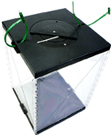Last week, I blogged about the 76,000 electronic balloting machines scheduled to be used in the Philippines' general elections today as having "technical issues" which required all of their memory cards to be replaced at the last moment.
There were fears expressed at the time that this wasn't going to be possible, especially in rural areas of the Philippines, and this would lead to election problems today. In fact, there was a news report on New Tang Dynasty Television over the weekend that 5% of the electronic balloting devices were not tested prior to the election in rural or violence-prone areas. This represents some 3 million potential votes, the report said.
Well, it looks like those predictions were at least partially correct, as the Philippine Star reports that the Commission on Elections (Comelec) has had to extend voting by (at least) one hour because of problems with the electronic voting systems, among other issues.
The news agency Reuters is saying that widespread technical failures of the e-voting machines has not been reported, although in some polling districts voters had to vote by paper ballot because of machine malfunctions. It will likely take a couple of days to find out how many e-voting machines were taken off-line.
In a related story, given the chaos in the UK general elections last week, there are renewed calls there to use e-voting machines in the next general elections. Given the likelihood of another general election being called within a year because of the hung parliament, that would appear to be unlikely.
Robert N. Charette is a Contributing Editor to IEEE Spectrum and an acknowledged international authority on information technology and systems risk management. A self-described “risk ecologist,” he is interested in the intersections of business, political, technological, and societal risks. Charette is an award-winning author of multiple books and numerous articles on the subjects of risk management, project and program management, innovation, and entrepreneurship. A Life Senior Member of the IEEE, Charette was a recipient of the IEEE Computer Society’s Golden Core Award in 2008.



